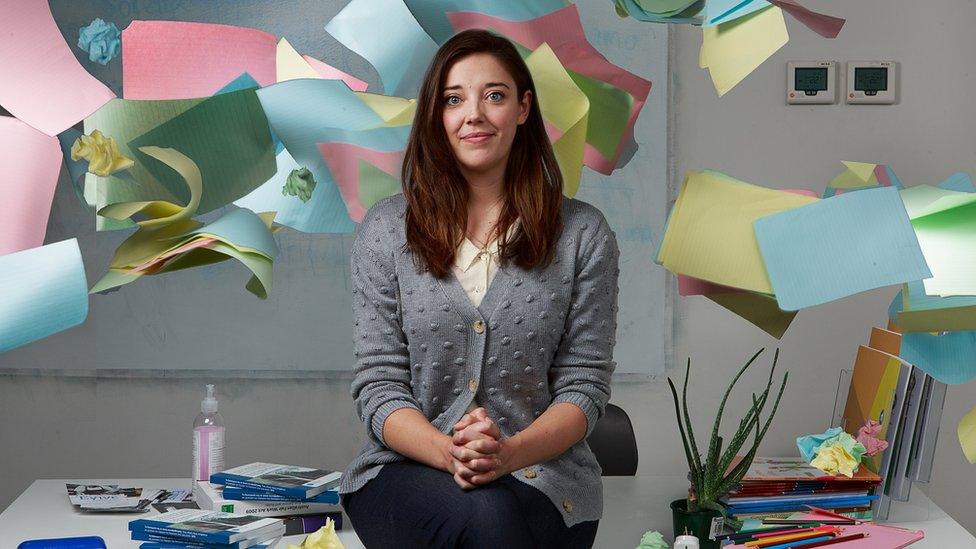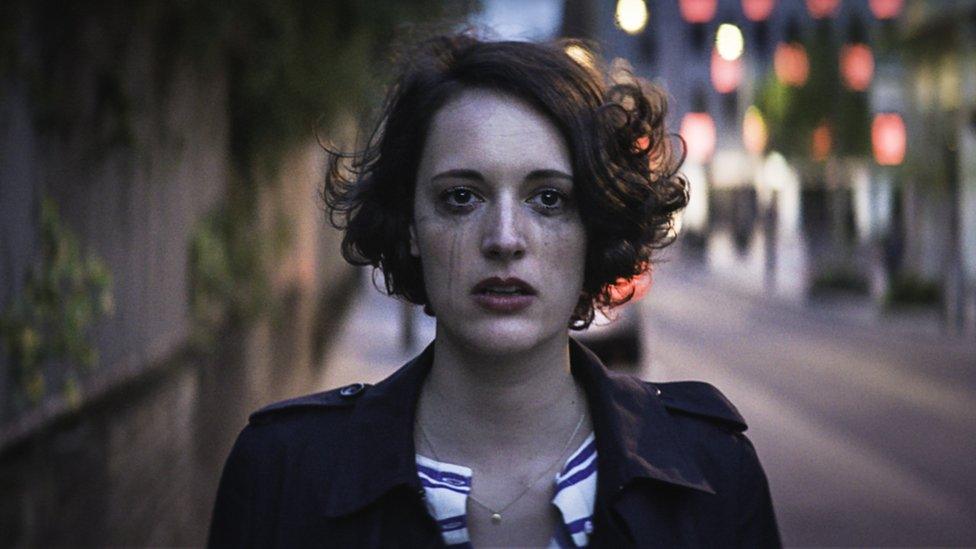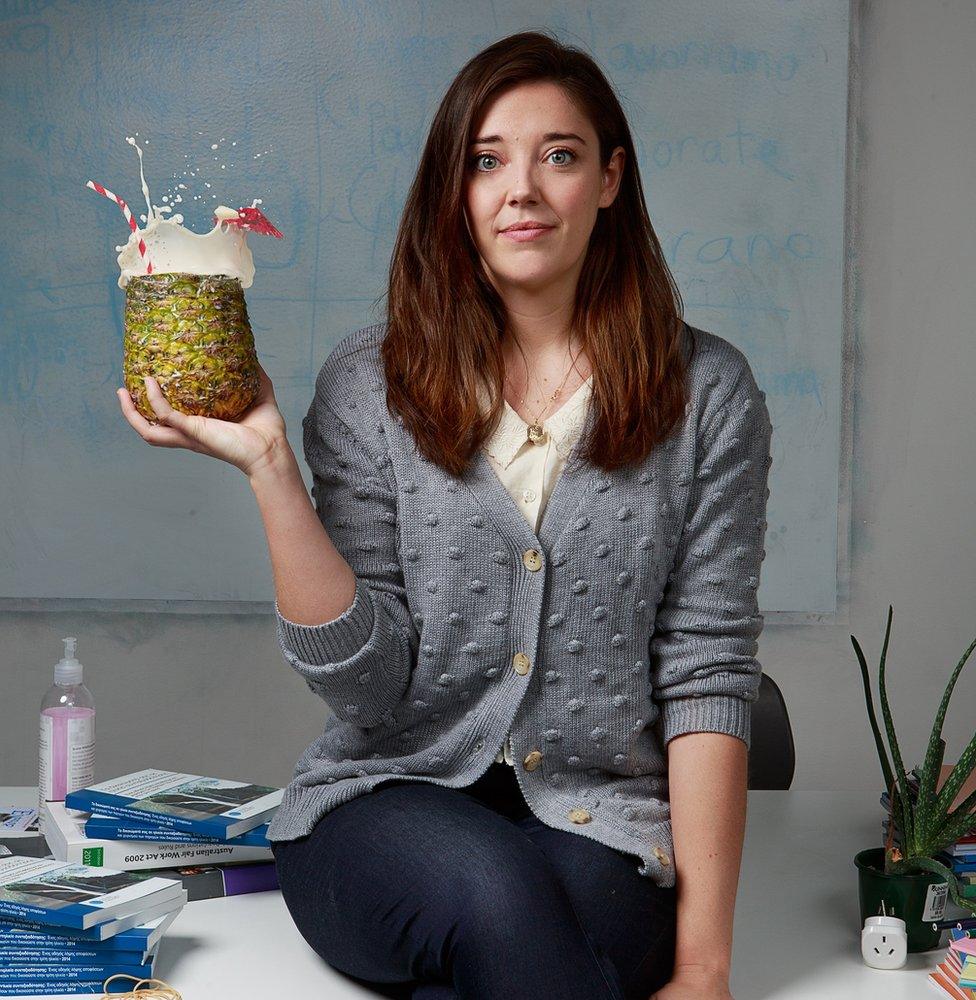Fleabag star Maddie tackles a silent issue on stage
- Published

Maddie Rice plays a teacher who wants her pupils to think she's cool
At Edinburgh Festival last year, Maddie Rice was the face and voice of Fleabag, the award-winning creation written by Phoebe Waller-Bridge.
But this summer, she had her own sell-out show there in Pickle Jar, a one-woman show about a teacher, known only as Miss, trying to act as a role model to her pupils when she feels far from being one.
"It's so funny that when you're at school you think teachers are almost inhuman and so sensible, that they never make mistakes," Maddie muses as the show begins a new run at London's Soho Theatre.
"But now I see my friends in their 20s teaching, then on the weekends they're being themselves and living young people's lives. They don't have all the answers. But they have to maintain this semblance of being a responsible person at work."
That's certainly the case for the character of Miss, a young teacher who wants to be "down with the kids" in the classroom but is struggling to work out how to reach them.
"I have a lot of young cousins who are 11 to 15 and they are so active on social media and can seem so mature. Other people in my generation can actually be quite innocent - it's like some of these kids could give you a sex education lesson," says Maddie.
Danger of silence
In Pickle Jar, Maddie - who played the main character in the stage play of Fleabag while it was touring - acts all of the characters, in a performance that has seen her win rave reviews.
While it has a light touch, and there are jokes about Tinder and boozy nights out, it also tackles issues of consent - and how a woman can feel that she is to blame for her own assault, and feel she has failed to protect others.
It's her writing debut, and came about after a conversation with Waller-Bridge, who encouraged her to "write about something that makes you laugh or cry".

Phoebe Waller-Bridge wrote and starred in BBC Three's Fleabag
It helped that Maddie's housemate is a teacher herself.
But then, the launch of the Me Too movement made her think about what people talk about - and what they keep inside.
"In this political age we've been talking a lot about the relationship between men and woman, equality and the Me Too movement," she says. "We're talking a lot about stuff which needs to be discussed but I wanted to explore what happens when things are suppressed.
"There are things that women have learned to do, like accepting responsibility for things that aren't their fault.
"It comes from a place of wanting to believe people are good and then you end up taking the blame yourself. But that is really damaging."
Why the silence?
While the stories Miss tells about a damaging relationship with an ex-boyfriend and drinking pina coladas might make people laugh at first, there is a darkness hiding in what she says, which slowly grows and builds.

Humour is necessary to stop the play being quite so intense, says Maddie Rice
"In Pickle Jar, the character of Miss feels a lot of guilt for being silent about something that happened to her when the same thing happens to someone else," says Maddie. "We all have to think about that - why are we being quiet? What would happen if we weren't?
"With all of this silencing, it leads to questions of what happens if we don't make space to talk about power dynamics and sexual assault in a mainstream space.
"I want you to laugh with the character of Miss. But then you find you're laughing at situations where she has lied about things or kept quiet.
"What happens when you don't discuss these things and where can these ripples, these effects, lead to? I'm interested in how we silence ourselves and I want people to feel more comfortable to talk about these things."
The humour is necessary to stop the play being quite so intense, she adds.
'Emotional experiences'
"In rehearsals, we explored everything in such detail I forgot it was meant to be funny. So one of the nice things was putting it in front of an audience and them laughing," she says.
"People really connected with the characters, which made it feel more gentle.
"I had a lot of really emotional experiences up there, including feedback from a lot of teachers.
"One guy came up to me who had had a really sad experience of losing a pupil, and it was amazing because he said he found it cathartic. He said it was nice seeing someone his age being a teacher and feel this responsibility and love for the people who come in and out of your life."
And as for the slightly confusing title? Well it comes from Mairead, who's Miss's best friend, using analogies that don't quite work - one of them involves talking about pickle jars.
"It's what happens when you don't say what you mean," adds Maddie. "But it's always good to have a bit of mystery with a title."
The whole experience of Edinburgh was "absolutely brilliant" she says - including the reaction from people who came to see the play.
"The journey up there, and a few weeks before, I was just a bag of nerves," she says.
"I just thought 'it could be awful'. Edinburgh feels like the UK's version of Los Angeles, where either your dreams come true or you're left on the streets, crying in the rain.
"It was a massive relief when people came and enjoyed it. It made me feel I take risks more often."

Follow us on Facebook, external, on Twitter @BBCNewsEnts, external, or on Instagram at bbcnewsents, external. If you have a story suggestion email entertainment.news@bbc.co.uk.